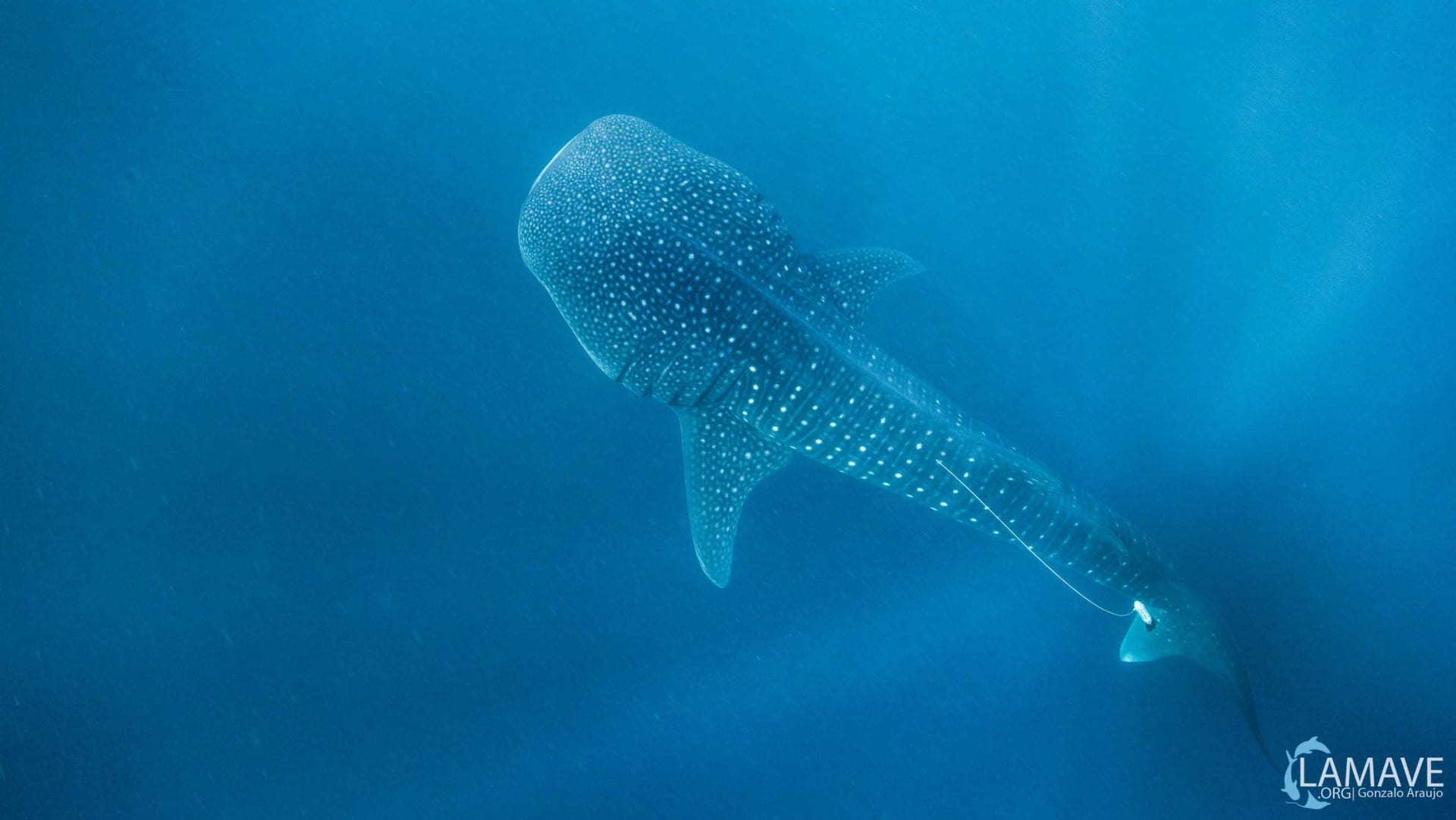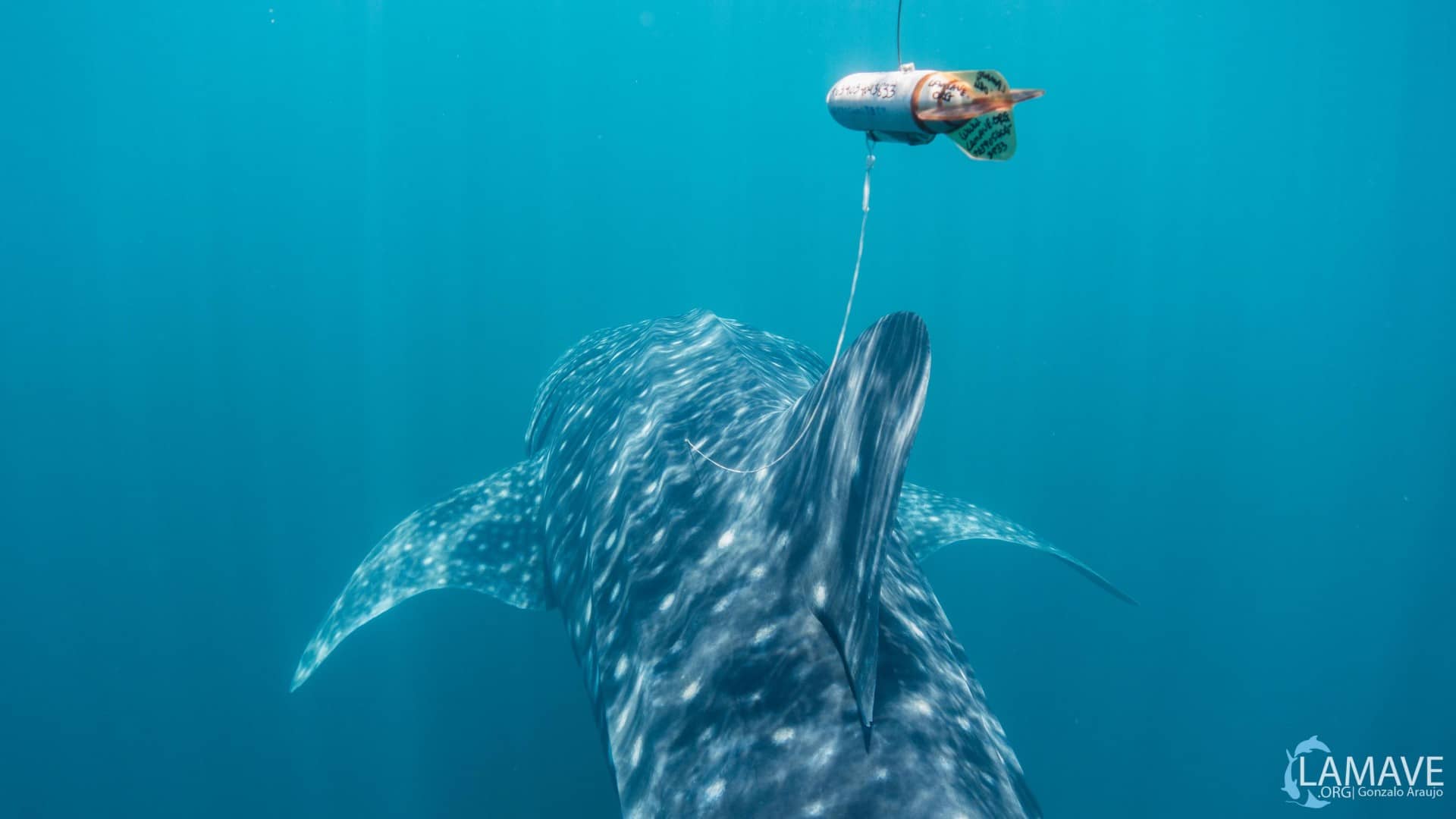News
Study reveals importance of Philippine waters to endangered whale sharks (Watch Video)

A new scientific study published in PeerJ – the Journal of Life and Environmental Sciences has tracked juvenile whale sharks across the Philippines emphasising the importance of the archipelago for the species. The study is the most complete tracking study of whale sharks in the country, with satellite tags deployed on different individuals in multiple sites.
The Philippines is an important hotspot for whale sharks and globally hosts the third largest known population of whale sharks (whaleshark.org). While the species has been protected in the Philippines since 1998, globally the species was uplisted in 2016 to ‘endangered to extinction’ in the IUCN Red List of Threatened Species due to a population decline of more than 50%, largely caused by continued exploitation in the Indo-Pacific. Particularly in South East Asia, concerns remain due to continued fishing in regional waters; understanding the movements of whale sharks in the Philippines is vital if we are to identify conservation priorities for the species.
By attaching Wildlife Computers SPOT5 satellite tags to whale sharks, researchers from Large Marine Vertebrates Research Institute Philippines (LAMAVE), Marine Megafauna Foundation (MMF) and Tubbataha Management Office (TMO) were able to follow the movements of juvenile whale sharks in near real-time to gain an insight into their behaviour. The tags work by communicating with passing ARGOS satellites, transmitting a location when the wet/dry sensor is triggered when a tagged whale shark breaks the surface. To aid transmission tags were tethered to a whale shark by a 1.8- meter line to ensure the tags broke the surface more frequently.
17 individual whale sharks were tagged in three different locations in the Philippines: Panaon Island (Southern Leyte), northern Mindanao (Misamis Oriental and Surigao del Norte) and Tubbataha Reefs Natural Park (Palawan). Tagging took place between April 2015 and April 2016. All tagged whale sharks were juveniles, ranging in size between 4.5 – 7 meters and 73% of them were male.
In their paper, peer-reviewed and published in PeerJ – the Journal of Life & Environmental Sciences, the researchers discovered that the tracks from the tags showed that all whale sharks stayed within the Philippines over the tracking period, emphasising the importance of the archipelago for the species. The longest track observed was from a whale shark originally tagged in Tubbataha Reefs Natural Park, which appeared to swim through the Sulu and Bohol Seas and into the Pacific, a journey accumulating over 2,500 km in length. While whale sharks are not known for their speed, results revealed that one individual whale shark was averaging 47km a day, further emphasising the species’ mobile tendencies.

Photo: Gonzalo Araujo
Lead author of the study, Gonzalo Araujo stresses that “this research highlights the high mobility of whale sharks, even juveniles, and the need for broader scale management and conservation plans for this endangered species.”
Dedicated research by LAMAVE and citizen science has identified over 600 individuals in the Sulu and Bohol Seas, yet the proximity of this population to fisheries in the broader region (South China Sea) means it is vital to monitor this population as a whole to understand if this population is in recovery or continuing to decline. Identifying threats and mitigation strategies is a conservation priority for the species. LAMAVE continues to study whale sharks in five key areas in the Philippines, working with local and national governments as well as collaborating organisations to develop conservation strategies for this iconic species.
Read the full article here: https://peerj.com/articles/5231.
Gear News
Introducing the TR-80, IR-50 and CS-30 Regulators from DYNAMICNORD

Whether you are a beginner or a professional diver – with the three new main regulators from DYNAMICNORD, everyone will find their favourite regulator. They all look super stylish.
Excellent performance with the TR-80
Quality and performance are the be-all and end-all for regulators. It is not for nothing that the TR stands for Tec Reg. The innovative design of the TR-80 guarantees absolute reliability – even in ice-cold waters.

Perfect breathing effort at 0.8 J/l / certified for diving in waters below 10 degrees / structural design made of solid brass for best cold protection / membrane-compensated design with dry seal of the first stage / reduced exhalation effort thanks to optimized exhalation membrane and bubble deflector / adjustable Venturi (dive/predive) and adjustment knob for individual inhalation comfort / innovative design of the front cover prevents free-flow in strong currents or when diving with scooters / design made of sandblasted brass, matt chrome finish / 2 HP and 4 LP outlets / mouthpiece made of high-quality, anti-allergic silicone for maximum comfort.


Amazing underwater adventures with the IR-50
The IR-50 is the top regulator for advanced and experienced divers. Natural breathing is the essence of this regulator.

Ideal breathing effort at 0.8 J/l /certified for diving in waters below 10 degrees / compensated membrane / adjustable venturi (dive/predive) and adjustment knob for individual inhalation comfort/ outlet valve and deflector for minimum exhalation effort and reduction of bubbles on the face / design made of sandblasted brass, matt chrome finish / 2 HP and 4 NP outlets / mouthpiece made of high-quality, anti-allergic silicone for maximum comfort.


The Workhorse – our CS-30
For diving centres and diving beginners – the workhorse stands for strong construction, reliability and robustness. Perfect for your training.

Optimal breathing effort at 0.8 J/l /recommended for diving in waters above 10 degrees / non-compensated piston / adjustable venturi (dive/predive) / outlet valve and deflector for minimum exhalation effort and reduction of bubbles on the face / design made of sandblasted brass, matt chrome finish / 1 HP and 3 NP outlets / mouthpiece made of high-quality, anti-allergic silicone for maximum comfort.


Octopus OP-30
The OP-30 is the ideal addition to all DYNAMICNORD regulators. It is identical in construction to the CS-30.

The TR-80, IR-50, CS-30 (DIN & INT) regulators and the Octopus OP-30 are available from DYNAMICNORD dealers and in the online store.
DYNAMICNORD – Your Outdoor Companion.
Marine Life & Conservation
Paul Watson Released as Denmark Blocks Japan’s Extradition Bid

Renowned anti-whaling activist Paul Watson has been released from custody in Greenland after spending five months in detention. Denmark’s Justice Ministry rejected Japan’s request for his extradition, citing insufficient guarantees that his time already served in custody would be credited against any potential sentence.
The 74-year-old Canadian-American was arrested on July 21 in Nuuk, Greenland’s capital, when his ship docked to refuel. His arrest was based on a 2012 Japanese warrant related to a 2010 encounter in Antarctic waters. Japan alleged Watson obstructed operations and caused damage to a whaling research ship during efforts to disrupt illegal whaling. Watson has consistently denied these claims, maintaining his commitment to marine conservation.
Denmark, which oversees extradition matters for Greenland, concluded that while the legal conditions for extradition were met, the lack of assurances from Japan regarding time-served credit made extradition untenable.
In a video shared by his foundation, Watson expressed gratitude and relief, saying, “After five months, it’s good to be out… and good to know they’re not sending me to Japan.” He added that the most difficult part of his time in custody was being separated from his two young sons.
Watson is a pioneering figure in marine conservation, known for founding the Captain Paul Watson Foundation in 2022 after decades of activism with the Sea Shepherd Conservation Society. His bold efforts to defend marine life have earned him widespread support, including from celebrities and conservationists. His work has also been featured in the acclaimed reality TV series Whale Wars.
Watson’s lawyer, Jonas Christoffersen, praised the decision, stating, “We are happy and relieved that Paul Watson is now free.” He added that Watson is eager to reunite with his family and continue his vital work.
The arrest occurred while Watson’s vessel, the M/Y John Paul DeJoria, was en route to the North Pacific with a team of 26 volunteers to intercept a Japanese whaling ship. His foundation described the arrest as politically motivated and emphasized that Watson’s actions were focused on ending illegal whaling practices.
Japan resumed commercial whaling in 2019 after leaving the International Whaling Commission, asserting that whale meat is a cultural tradition. Conservationists, however, continue to challenge these practices, highlighting their impact on marine ecosystems.
Despite the challenges, Watson remains steadfast in his mission to protect marine life and bring attention to whaling practices. His dedication to ocean conservation has made him a globally respected advocate for the environment.
-

 News2 months ago
News2 months agoIconic SS United States to become the World’s Largest Artificial Reef
-

 News3 months ago
News3 months agoBook Review – 52 Assignments: Underwater Photography
-

 Gear News3 months ago
Gear News3 months agoDYNAMICNORD – New German diving brand enters the British market
-

 News3 months ago
News3 months agoExploring Cenote El Pit: A Diver’s Dream
-

 Gear News3 months ago
Gear News3 months agoTry BARE drysuits (and maybe even win one!) this Friday with Sea & Sea at North West Dive Fest
-

 Marine Life & Conservation3 months ago
Marine Life & Conservation3 months agoBook Review: Coral Triangle Cameos
-

 Blogs2 months ago
Blogs2 months agoDive the Egyptian Red Sea this Autumn with Regaldive
-

 News3 months ago
News3 months ago2024 Ocean Art Underwater Photo Competition Announced















